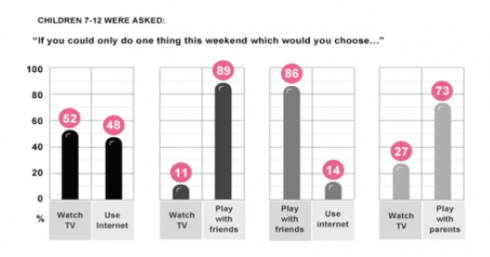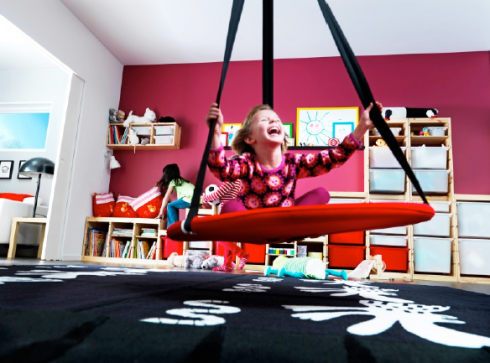This is pretty interesting…
IKEA conducted a children’s project, called Playreport – it explores child development and play worldwide and is currently the biggest global survey on play and child development to date.
It is now a living, continuing survey about the state of play and is now live at http://www.facebook.com/pages/Make-the-world-play-more-playreport-USA/124553714222962?v=wall If you so desire, please “like” the project on facebook and make sure to check out the “state of play” video – it’s pretty cute (which is currently disabled for some reason!). Plus, lots of cool findings such as:
– Parents say they’ve “forgotten how to play”
– Children prefer playing with their parents to watching TV
Parents Rejoice! Children would rather play with you than watch TV!
A global study on play asked children aged 7-12 a series of paired-choice questions in an attempt to figure out what they would rather do – watch TV or play with their friends or parents. The results were overwhelming; nine out of ten children preferred playing socially. While playing with friends did beat playing with parents in most cases (89% preferred friends), nearly three-quarters of kids agreed that they preferred playing with their parents over watching TV. While data like this may come as a pleasant surprise to adults who worry that kids today prefer screen entertainment over more active types of play, Dr. Barbie Clarke, co-author of the report, was not surprised by the results.
According to Clarke, “Children are social creatures by nature. When they play with others, kids develop the ability to encode and decode emotional messages. They become empathic and develop social skills that will be vital later on in life. So while we may think that children would love to be attached to a screen of some sort, most show a natural inclination to socialize with others through play.†Research for the study was initiated by home furnishings retailer IKEA. Called the Playreport, the survey conducted interviews with 7,933 parents and 3,116 children (aged 7-12) across 25 different countries in an attempt to explore issues about parenting, children and the ‘state of play’ across the world. Work on the Playreport began in 2009 with the results published in May, 2010.
For some parents, proof that their kids want to play with them more than the sedentary activity of watching TV might come as guilt inducing news. According to the report, almost half (45%) of parents surveyed feel they don’t have enough time to play with their children, while the same proportion said they often feel guilty about spending too little time with their kids.
Furthermore, when parents do find the time to play, many feel too distracted by other concerns. One quarter of parents surveyed agreed that “When I play with my children I am often too stressed to enjoy it.â€
Dr. Barbie Clarke finds this quite normal. “We live in a cash-rich, time-poor society.†She adds, “what’s really interesting is that parents today spend four times more time with their children than they did in 1975. So actually we’re spending more time with our children, but we’re feeling more guilty than ever.â€
Clarke attributes this in part to the modern emphasis and awareness about child development in general. “Parents feel they need to stimulate and entertain their children from the moment they’re born.â€
This type of self applied pressure might be a result of the often publicized belief that activating children’s minds correlates directly with intelligence. Clarke agrees with this theory — but with limits: “I think some parents risk being overly conscientious. There’s this idea that as a parent, I have to stimulate and look after my children constantly — when actually the most important thing is to engage emotionally with them. They don’t necessarily need parental or adult input all the time.â€
“It’s not uncommon to hear people express the idea that play is a child’s job,†comments research advisor Derek Lyons. “But do we actually mean that play is a child’s job until they have something more important to do? In many ways, play is on the defensive these
days – recess periods at schools are being reduced, and in the home, free play is often squeezed out by scheduled activities. The irony is that play is one of the most powerful learning engines for children – play and learning aren’t opposing forces.â€
The report also revealed that many parents find play stressful, tedious, even difficult. “A common thread was that many parents feel they have lost the ability to play,†explains Dr. Clarke. “This could be tied to the fact that more adults are becoming parents at an older age. They have a baby and it feels strange – their previously ordered lives are suddenly disrupted; they don’t know how to play spontaneously.â€
But perhaps there are things adults can learn from children. Play involves letting go in a way adults aren’t used to. “I think we’ve reached a place where the idea that you have to stop playing when you become an adult is finally fading away,†says blogger GeekDad, Ken Denmead. “The unintended result of grown-ups playing is something wonderful – we remain connected to our kids.
There’s a press kit is available here: http://press.playreport.org/us/



Awesome article! thanks for this great article. It isso informative:)